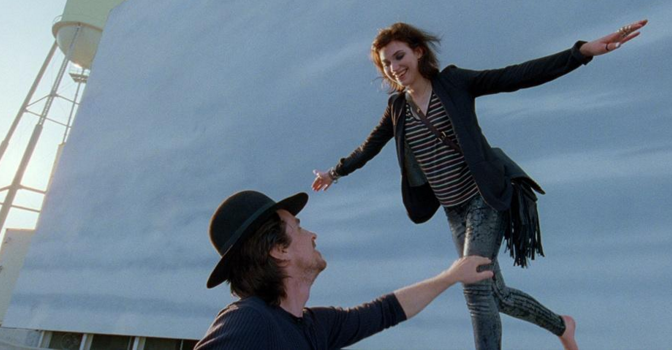Among one of the most polarizing directors currently making movies, Terrence Malick has returned to showcase his usual fragmented style with Knight of Cups, an impressionistic film that follows troubled screenwriter (is there any other kind?) Rick (Christian Bale) as he pursues a number of different women who each seem to offer him something unique in aesthetic and personality, but ultimately all prove themselves to be disappointingly similar in that they can’t sustain him in contentment.
Because it’s hard to view any character played by Bale as not possessing certain Patrick Bateman qualities, Rick comes across as the sort of person so deeply unhappy that no amount of material or pussy could ever allay his woes. To compound the fraught state of his psyche is the recent death of one of his brothers, paired with the vagabondery of his remaining brother, Barry (Wes Bentley), in response to their sibling’s permanent absence.
Divided into eight segments named after tarot cards (a bit cliche for Malick)–save for Freedom–Knight of Cups interweaves choppy shots of L.A. with an even choppier narrative. The most cohesive segment is arguably the establishing chapter, The Moon, wherein he encounters his first tour de force woman, Della (Imogen Poots), a girl he meets in a restaurant and comments, “Lucky me” when Rick tells her she has beautiful eyes.
Her quintessentially rebellious look (non-conventionally colored hair, leather jacket) is what draws Rick to her for a time, though, in spite of her physical banality she does end up making one of the most astute comments of the film, which is, “You don’t want love. You want a love experience.” And, in fact, it isn’t just Rick who feels this way, but most men looking for salvation and inspiration in the form of a woman.
Regardless of Della’s cold, scrutinizing assessment, which also infers he’s mostly with women to draw some sort of artistic creativity from them, Rick continues on his philandering path, even revisiting his ex-wife, Nancy (Cate Blanchett, far too under used in this role), for yet another faint search for meaning. She can’t give him what he’s looking for, naturally, merely serving as a ghost of his past that might potentially help him learn how not to make the same mistakes in the future. But then, it wouldn’t be a Malick movie if his protagonist was able to do that.
And so, instead of gleaning new lessons from his memories of and encounters with Nancy, Rick moves on to the next would-be angel, Helen (Freida Pinto), a demure model with little to offer in the form of screen presence other than a pleasant face. Rick casts her off for an archetypal “sage stripper” who tells him he can be anything he wants to be, that reinvention is easy. This is enough to reel him in; she serves as something of a foil to Della, but with more obsequiousness than defiance.
Finally, we’re brought to the Death segment of the film, which saves the best (in some people’s eyes) for last in the form of Natalie Portman as Elizabeth, a woman who has an affair with him and ends up getting too hurt in the end by a certain event to continue on with the relationship–even though it is the closest thing to love Rick has ever experienced.
A concluding chapter called Freedom doesn’t do much to make us feel like Rick is ever really going to be “okay.” But he can try to be. That’s all any of us can do. If only Malick could have delivered this message in a more impressive way–one befitting of his capabilities. Then again, attempting to essentially crossbreed Sunset Boulevard with American Psycho takes more gumption that most directors have these days. So in this sense, Malick’s still got it.





















